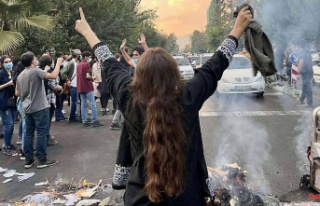A major Franco-German event is canceled and the chancellor travels alone to Paris instead. In the relationship between the two closest allies, Scholz has a lot to fix. Above all, President Macron feels misinformed and disrespected.
Chancellor Olaf Scholz's meeting with French President Emmanuel Macron in Fontainebleau looks like a consolation prize for the French government. Bilateral government consultations should actually take place and be celebrated on Wednesday - a major event in the relationship between the two most important EU states and closest allies. But the meeting of the cabinets was canceled at short notice last week. This makes it clear that the relationship between the two countries is currently crunching. According to information from government circles in Berlin and Paris, the dissonances have several causes.
The chemistry between Macron and Scholz
When the SPD politician took office, it was already certain that the extroverted Macron and the rather demure Hanseat Scholz would not necessarily harmonize. The personal relationship is described more critically on the French side than on the German side. The reason is also the competition between the two, who is now "number one" in the EU after Angela Merkel's departure. In the first few months in particular, Macron wanted to mark his territory by going it alone. Now the chancellor is catching up with the largest EU economy - including his Prague EU speech. There is also a certain disappointment in Paris that Scholz is not more open to communitarizing debt and aid in EU financial policy, for example.
Bad flow of information
"The Elysee Palace saw it as a serious problem that the traffic light government did not inform its closest partner in advance about the 200 billion euro relief package," said France expert Ronja Kempin from the German Institute for International and Security Affairs (SWP). . The Macron team is angry that Chancellor Wolfgang Schmidt was in Paris the day before the "double boom" decision and is said not to have mentioned the 200 billion package there. It was said in Paris that something like this would never have happened under Merkel. In addition, Macron reacted coldly to the fact that Scholz had mentioned neither the special Franco-German relationship nor the Franco-German armament projects in his Prague speech. On the German side, reference is made to the difficult and time-consuming coordination between the coalition partners SPD, Greens and FDP. But internally there is also criticism of the vote by the Chancellery. The government consultations fell in the middle of the autumn holidays, and a number of cabinet members could not have traveled to Fontainebleau.
Sensitive French
"However, Macron is also on the defensive," SWP expert Kempin explains the sensitivity. In Mali, the policy of the former colonial power failed miserably. And with the joint armaments project FCAS, the problem of a lack of progress lies above all in the internal French dispute between the aircraft manufacturers Airbus and Dassault. Here Macron is avoiding a word of power. In Ukraine politics, on the other hand, Germany has taken the lead with the reconstruction conference - France is following suit. Especially since Macron's talks with Russian President Vladimir Putin made no progress.
Disagreements in energy crisis
The dissonances ensured that Macron said at the EU summit, not very diplomatically, with a view to the debates on aid packages and gas price caps, that it would not be good if Germany "isolated itself". France would like more EU finances to fight the energy crisis. Germany does not want this. It is also seen as a problem that Scholz, in his speech about the 100 billion special fund for the Bundeswehr, announced the purchase of American F35 jets, but did not mention the joint armament projects.
Stealth Advances
However, observers warn against exaggerating the differences in Franco-German relations - which the federal government tends to downplay anyway. Because clandestinely, there was also significant progress in a number of areas: According to government circles, Russia's attack on Ukraine corrected Macron's rejection of the Western Balkan states' EU accession. Conversely, Scholz ensured that Macron's single-handedly proposed new European Community was a success with a meeting in Prague.
In October, France will deliver gas to its eastern neighbor for the first time - while Germany supplies its neighbor with electricity. And Macron gave up his opposition to a Spanish connection to the European gas grid last week - except that the pipeline will now not run through the Pyrenees, but off the coast to Marseille. Scholz retaliated by clearly taking the French position in the traffic light dispute over arms export controls: the chancellor and the defense minister made it clear publicly that there should no longer be a German right of veto on joint armaments projects - an announcement to the Green coalition partner.












